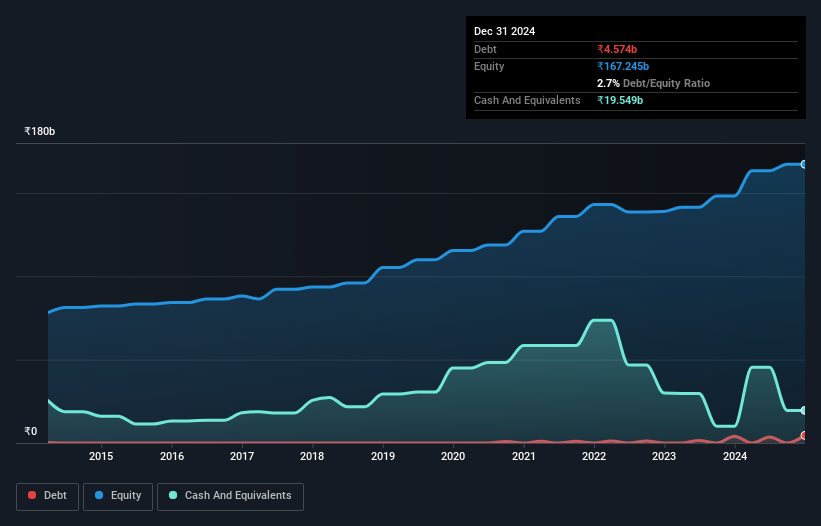The external fund manager backed by Berkshire Hathaway's Charlie Munger, Li Lu, makes no bones about it when he says 'The biggest investment risk is not the volatility of prices, but whether you will suffer a permanent loss of capital.' When we think about how risky a company is, we always like to look at its use of debt, since debt overload can lead to ruin. We note that ACC Limited (NSE:ACC) does have debt on its balance sheet. But should shareholders be worried about its use of debt?
What Risk Does Debt Bring?
Debt assists a business until the business has trouble paying it off, either with new capital or with free cash flow. Ultimately, if the company can't fulfill its legal obligations to repay debt, shareholders could walk away with nothing. However, a more common (but still painful) scenario is that it has to raise new equity capital at a low price, thus permanently diluting shareholders. By replacing dilution, though, debt can be an extremely good tool for businesses that need capital to invest in growth at high rates of return. When we think about a company's use of debt, we first look at cash and debt together.
What Is ACC's Debt?
The image below, which you can click on for greater detail, shows that at September 2024 ACC had debt of ₹4.57b, up from ₹4.07b in one year. However, its balance sheet shows it holds ₹19.5b in cash, so it actually has ₹15.0b net cash.

How Healthy Is ACC's Balance Sheet?
We can see from the most recent balance sheet that ACC had liabilities of ₹59.4b falling due within a year, and liabilities of ₹10.6b due beyond that. Offsetting this, it had ₹19.5b in cash and ₹11.6b in receivables that were due within 12 months. So it has liabilities totalling ₹38.8b more than its cash and near-term receivables, combined.
Since publicly traded ACC shares are worth a total of ₹359.7b, it seems unlikely that this level of liabilities would be a major threat. However, we do think it is worth keeping an eye on its balance sheet strength, as it may change over time. While it does have liabilities worth noting, ACC also has more cash than debt, so we're pretty confident it can manage its debt safely.
See our latest analysis for ACC
And we also note warmly that ACC grew its EBIT by 12% last year, making its debt load easier to handle. There's no doubt that we learn most about debt from the balance sheet. But it is future earnings, more than anything, that will determine ACC's ability to maintain a healthy balance sheet going forward. So if you're focused on the future you can check out this free report showing analyst profit forecasts.
Finally, a company can only pay off debt with cold hard cash, not accounting profits. While ACC has net cash on its balance sheet, it's still worth taking a look at its ability to convert earnings before interest and tax (EBIT) to free cash flow, to help us understand how quickly it is building (or eroding) that cash balance. Over the last three years, ACC saw substantial negative free cash flow, in total. While that may be a result of expenditure for growth, it does make the debt far more risky.
Summing Up
Although ACC's balance sheet isn't particularly strong, due to the total liabilities, it is clearly positive to see that it has net cash of ₹15.0b. On top of that, it increased its EBIT by 12% in the last twelve months. So we don't have any problem with ACC's use of debt. The balance sheet is clearly the area to focus on when you are analysing debt. However, not all investment risk resides within the balance sheet - far from it. Case in point: We've spotted 2 warning signs for ACC you should be aware of, and 1 of them is a bit unpleasant.
Of course, if you're the type of investor who prefers buying stocks without the burden of debt, then don't hesitate to discover our exclusive list of net cash growth stocks, today.
New: Manage All Your Stock Portfolios in One Place
We've created the ultimate portfolio companion for stock investors, and it's free.
• Connect an unlimited number of Portfolios and see your total in one currency
• Be alerted to new Warning Signs or Risks via email or mobile
• Track the Fair Value of your stocks
Have feedback on this article? Concerned about the content? Get in touch with us directly. Alternatively, email editorial-team (at) simplywallst.com.
This article by Simply Wall St is general in nature. We provide commentary based on historical data and analyst forecasts only using an unbiased methodology and our articles are not intended to be financial advice. It does not constitute a recommendation to buy or sell any stock, and does not take account of your objectives, or your financial situation. We aim to bring you long-term focused analysis driven by fundamental data. Note that our analysis may not factor in the latest price-sensitive company announcements or qualitative material. Simply Wall St has no position in any stocks mentioned.
About NSEI:ACC
ACC
Engages in the manufacture and sale of cement and ready-mix concrete in India.
Flawless balance sheet with proven track record.
Similar Companies
Market Insights
Community Narratives




